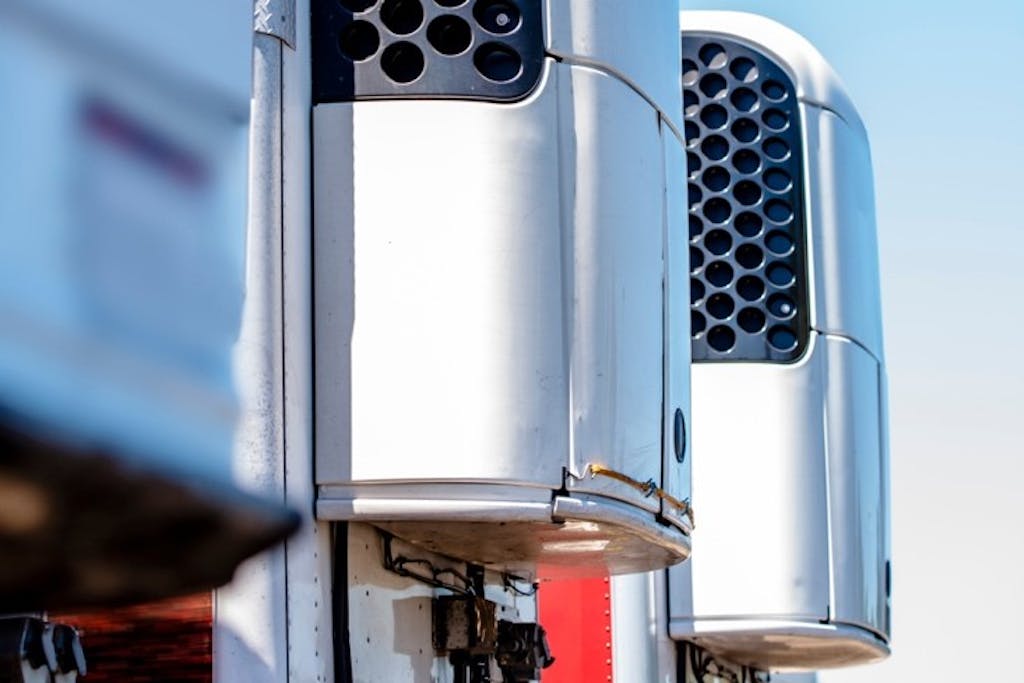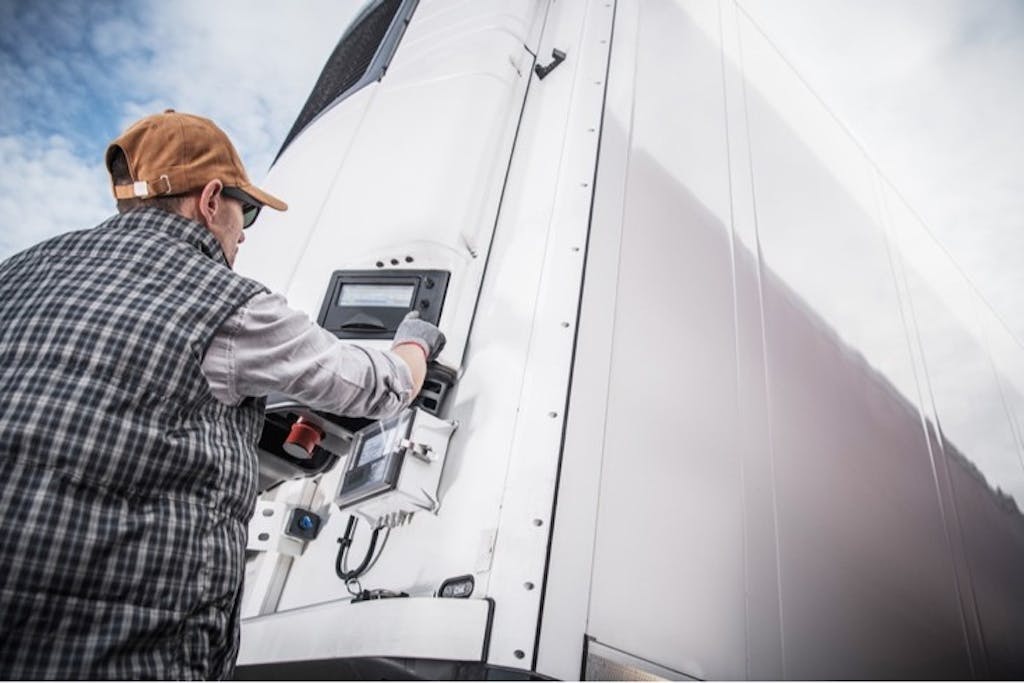4 Common Reefer Unit Issues and How to Troubleshoot
October 9th, 2019
Refrigeration trailers, also known as reefers, make up a large, dynamic part of the freight and logistics industries. Without reefers, temperature-sensitive goods can only be transported a matter of miles from their starting location. That’s not far when considering that many perishable goods these days travel hundreds of miles via reefers to arrive at their destination.
Like any trailer, reefer trailers experience occasional issues that require attention. Attending to issues with reefers is particularly important due to the sensitivity of products being transported. If the issues relate to a reefer unit not cooling properly, it can result in cargo becoming spoiled and unusable. That spells big losses for all stakeholders.
To avoid issues, it helps to be familiar with the most common problems associated with reefer trailers and what signs indicate that a reefer may need preventive maintenance. Drivers can benefit from having in-depth knowledge about their reefers, especially since they are ultimately responsible for maintaining proper temperatures during transport. Here are a few common problems that may arise with reefer trailers and how to approach them.

How to Know a Reefer Unit May Not Be Cooling Properly
If you’re looking into reefer trailer rentals, you’ll want to first consider what goes into maintaining the trailer, specifically regarding its cooling capacity. Reefers require a fair amount of investment, but because their demand is high, these trailers can be a worthwhile investment with some understanding of how they operate.
Be Aware of Leaks
Leaks come in many forms, including fluid and air leaks. Since reefers contain several mechanisms that aid in the cooling process, there is potential for leaks in a variety of areas. If a reefer unit is not cooling properly, checking for leaks is a good place to begin investigating.
Fluid leaks
Like any vehicle, fluid leaks are a common problem. Of course, it’s always wise to check typical leak sights, like oil from the engine. When it comes to cooling issues, you’ll want to look in other areas for the source of leaks, particularly those that directly relate to the compressor and condenser that support the reefer’s cooling abilities.
The following are places to check for fluid leaks if there is a noticeable change in reefer temperature:
- Equalizer Tubes: This controls the flow of liquid refrigerant entering the evaporator. It’s an important component of the overall cooling system, but also one of the first places to check for fluid leaks. If there is a leak from the equalizer tube, it is cause for concern and maybe the reason for ineffective cooling.
- Cracked Cooling Hoses and/or Belts: Cracked, broken, or worn hoses can be a major source of concern if a reefer is not cooling properly. There are many hoses and belts that make up cooling systems, both for refrigeration and engine function.
Also, check to see if leaks are happening constantly, or only when the unit is ON or OFF. Leaks that occur at specific times may help to diagnose the problem more quickly.
Air leaks
Like fluid leaks, air leaks are a common problem in reefer trailers. If seals are ineffective, cool air can escape the trailer and warm air can enter. It can be easy to miss air leaks if reefers aren’t receiving regular maintenance, so it’s particularly important to stay on top of having your trailer routinely serviced.
The following are places to check for air leaks:
- Broken seals: Seals are located in a number of places, but most commonly associated with doors. There are also seals used in other places like air chutes that can be broken or cracked.
Also, be aware of hinges on doors. If they are broken or corroded, they may contribute to improper cooling.
Calibration for Sensors
Calibrators help to regulate temperature, and if they are faulty, it can result in a damaged load. Sensors help alert drivers to any changes in reefer temperature, but even the sensors themselves can have issues. If they give inaccurate readings or alerts are not given at the proper time, a reefer may not be cooling properly for an extended period, putting cargo at risk.
Condenser
Condensers act as heat exchangers. Just as a radiator helps to maintain a stable temperature for a car’s engine, a condenser acts as a support to maintain stable temperatures in reefer trailers.
There a number of components such as coils, clamps, bolts, and tubes within the condenser. Damage to any of these parts can be detrimental to the overall function of the cooling system.
Bulkhead Issues
Bulkheads are used to separate different types of temperature-sensitive cargo within the same trailer. If airflow through bulkheads is blocked or faulty, it can affect different temperature zones within the trailer. This is particularly concerning if operators are shipping different types of goods that require varied storage temperatures.

Maintaining and Troubleshooting a Reefer Trailer
The first step to avoiding improper cooling in a reefer is to receive regular maintenance. Check with the manufacturer to ensure that the reefer is being serviced at the recommended intervals.
Generally, it’s best practice to have service checks done every 90 days. During summer months, drivers may want to receive more frequent service as the cooling systems have to work harder. Addressing issues before they worsen will save time and money and keep operators on the road with more consistency.
In addition to regular maintenance, it’s wise for drivers to begin each trip with an inspection of their own. It’s not uncommon to find small issues that can be addressed before loading cargo and thus prevent a lost shipment. Here are some simple items to check pre-trip:
- Check hoses, belts, and seals for cracks or wear
- Check for any visible leaks around or within the reefer or its compressor unit
- Ensure that doors close tightly and lock
- Check that displays are functioning and represent accurate measurements and temperatures
For an added layer of protection against a reefer not cooling properly, drivers can use thermometer sensors in the trailer. Placing them in different temperature zones and at the top, bottom, front, and back of the trailer will ensure that the temperature being measured matches displays.
Reefer trailers that have sensors with alarms can be very helpful for drivers so they don’t miss temperature fluctuations or maintenance issues.
Reefer Troubleshooting
Drivers who regularly operate a reefer trailer or other commercial trailers should be well-informed and educated about the trailer. Knowing how to perform simple maintenance if there are issues on the road can help prevent serious problems with a shipment.
One of the most important skills for troubleshooting is to have a thorough knowledge of how to read and interpret alerts from the cooling unit. Codes will indicate certain issues with elements in the reefer such as the battery, belts, or pressure problems.
In addition to understanding how to read and operate all equipment within the reefer, it’s helpful to keep UV coolant leak detector handy. If a driver believes that a leak is occurring but can’t locate it by a simple eye test, using a UV leak detector will illuminate the source of a leak.
Rent or Purchase a Reefer
If you are looking to purchase or rent a reefer trailer, it’s important to first consider and understand the nuances of operating a reefer trailer to know if your investment will be worthwhile.
Hale Trailer offers a wide variety of reefer trailers for rent at 12 trailer rental locations. We also carry new and used reefer trailers from some of the top manufacturers, including Hyundai, Great Dane, Utility, and Wabash. We pride ourselves on offering industry-leading customer service to help you choose the right commercial trailer for your specific needs. Contact one of our trailer experts to discuss your requirements and learn more about the services Hale Trailer offers.
All the information on this website – https://www.haletrailer.com – is published in good faith and for general information purposes only. Hale Trailer Brake and Wheel does not make any warranties about the completeness, reliability and accuracy of this information. Any action you take upon the information you find on this website, is strictly at your own risk. Hale Trailer Brake and Wheel will not be liable for any losses and/or damages in connection with the use of our website.
